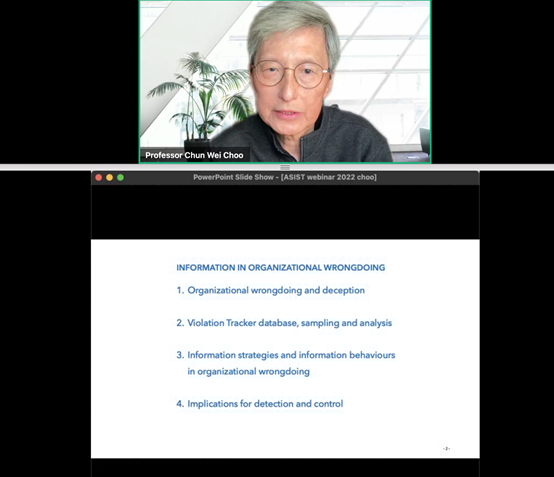On May 12, a webinar co-organized by the Center for Studies of Information Resources, Wuhan University, and Association for Information Science and Technology (ASIS&T) Special Interest Group on Knowledge Management (SIG-KM) was held. Chun Wei Choo, Professor at the Faculty of Information at the University of Toronto, gave a lecture entitled Information in Organizational Wrongdoing, which attracted more than 260 students and teachers from home and abroad. Lu An, Professor at the SIM of Wuhan University, Chair of ASIS&T SIG-KM, presided over the webinar and Cathy Nash, Director of ASIS&T Conference and Events, addressed at the webinar.

Chun Wei Choo began by describing what organizational wrongdoing is and the key role that information management and manipulation play in it. He has focused his research on deception as a strategy to control and distort information. The study uses the Violation Tracker Database from the NGO Good Jobs First, from which the researchers selected 80 cases covering corporate wrongdoing with high fines in the U.S. between 2000 and 2020, with the highest average penalties in the financial-related case group and the second highest in the environmental-related case group.

Chun Wei Choo analyzed the relevant documents (e.g., settlement agreements, official press releases, etc.) for each case, first identifying cases of wrongdoing in which organizations intentionally used information to deceive or mislead others, thereby causing significant harm, then analyzing the general information tactics used by the organizations in these cases, and finally exploring the specific information behavior that organizations engaged in to pursue their information goals and strategy. The study found that organizations intentionally used information to mislead others and cause harm accounted for 60% of the 80 cases selected. Chun Wei Choo concluded two information strategies: one is sowing doubt, for example, the tobacco industry defends its products by questioning the scientific conclusion that smoking causes cancer; The other is exploiting trust, a typical case of JP Morgan Chase, which concealed the actual quality of mortgages when it sold mortgage-backed security to investors.

For the information manipulation behavior of organizations to achieve the above information objectives, Chun Wei Choo classified them into three categories: information obfuscation, information concealment and information falsification. He further explored the organization's choice of information strategy, and found that if the external information environment is competitive, the organization will adopt the "sowing doubt" strategy; If the information environment is controllable, the strategy of "exploiting trust" will be adopted. The research result has important enlightenment to legislation and supervision. To control "sowing doubt", managers can help people build trust in experts and cooperate with independent research institutions; For "exploiting trust", it is necessary to ensure the availability of accurate information.
During the interactive session, the teachers and students showed strong interest in the lecture and actively asked questions. Chun Wei Choo patiently answered the audience's questions, such as how to balance the trust and doubt of scientific facts, and recommended relevant reference books and papers on organizational wrongdoing, information strategy and behavior, knowledge management, etc. The lecture triggered teachers and students to think about organizational information strategy and behavior, and was widely appreciated by the participants.